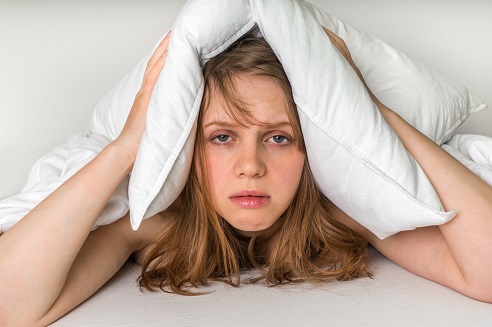We all have trouble falling asleep at some point. The reasons are endless as to what keeps us awake. It could be a stressful day, a problem we have not found the solution for, that soda or dessert we had with dinner, worrying about the kids, marriage or relationship problems, or something more complex such as trauma. Whatever the reason, insomnia is a widespread problem in our fast-paced lives and lack of sleep can make symptoms of anxiety, stress or depression worsen.
Some people think they only need 4-5 hours of sleep at a time, but most adults need 7 hours on a regular basis. When we do not get enough sleep, our circadian rhythm gets thrown off. This is a biological rhythm that occurs over approximately 24 hours and is linked to nature’s light-dark cycle. When we don’t get enough sleep, the effects show up in our work, school, reflexes, eating habits, and our overall mood.
It is possible for anyone to sleep better by adjusting their environment and sleep routine. Developing a good, consistent sleep routine can help to break a negative pattern of sleep disturbances. Below are some ideas that you can choose from and implement on a consistent basis that can help to establish a routine.
- Vigorous, daily exercise for 20-30 minutes, but not right before bed. This release endorphins, that happy hormone.
- Take a warm bath or shower several hours before bedtime. As your body cools down you may find sleep easier.
- Drink warm milk 30 minutes before bedtime.
- Make the room temperature cool and comfortable before going to bed.
- Drink turkey broth at dinner. Turkey broth contains L-tryptophan that makes us sleepy, think Thanksgiving dinner!
- Take a Melatonin tablet 30 minutes before bedtime. This is a natural sleep aid that the body produces that can be bought over the counter.
- Avoid all caffeine after about 3 pm such as coffee, teas, and chocolate.
- Drink a warm sleepy time tea 30 minutes before bed.
- Avoid spicy foods at dinner or at night.
- Avoid screens (tv, phone, tablet, computer) 30 minutes before bed.
- Read a book in bed.
- Avoid conflict, news, or anything anxiety producing before bed.
- Try going to bed and getting up at the same time each day.
- Try a deep muscle relaxation technique while lying in bed to reduce tension and stress.
- 15. Practice a deep breathing exercise.
- Write down any disturbing thoughts or issues to get them off your mind. You can deal with them tomorrow.
- Try imaging your happy place then engage all your senses. Image all you see, feel, taste, smell, and hear in this place.
- Play relaxing music, use a sound machine, or a relaxation tape.
- Pray.
- Try writing about or taping your day.
- Do a boring task or read a boring book.
- Sleep in the same place, no bed hopping.
- Use a nightlight if necessary.
- If you have trouble falling asleep because you worry a lot, schedule a “worry time” during the day that is several hours before bed.
- Check with your doctor to see if you are on any medications that may interfere with sleep.
Set a consistent routine for yourself at bedtime such as:
- Do something relaxing
- Choose a good time to go to bed each night and then do this for one week.
- Begin to get ready for bed 1 hour before your set bedtime by doing your personal routine, (i.e.: brush teeth, prepare your clothes for the next day, lock up the house)
- Use a relaxation technique to help you sleep (deep breathing, deep muscle relaxation)
- Lie down and listen to music
- Close your eyes and give yourself permission to relax, rest and sleep.
Shift workers may also have trouble falling asleep as schedule changes may make it difficult to maintain a normal circadian rhythm. This can lead to signs of depression or anxiety. To help realign one’s biological clock, use a bright light during waking shifts and make the room dark when not working.
Establishing a consistent sleep routine can help restore your circadian rhythm and a restful sleep pattern. After implementing a few of these ideas, if you find you are still having trouble falling to sleep, it may be time to see your doctor or health care provider. If the trouble seems to be more of worry, sadness, or anxiety, a mental health therapist may be able to help by giving you tools and techniques and by helping you get to the root of the issue. Here’s to having sweet-dream!
For more information about anxiety or depression counseling, click here.
About the Author 
Julia Nelson, LPCA, LMFTA is a psychotherapist and owns a private practice in Flat Rock and Forest City, NC. In general, she specializes in couples counseling, anxiety and depression counseling, premarital counseling, and parenting classes. She is also a Certified Clinical Military Counselor. To find out more about Julia click here: Nelson Christian Counseling.
Want tools for your life and relationship? Get my latest blog post by liking my Facebook page here.

